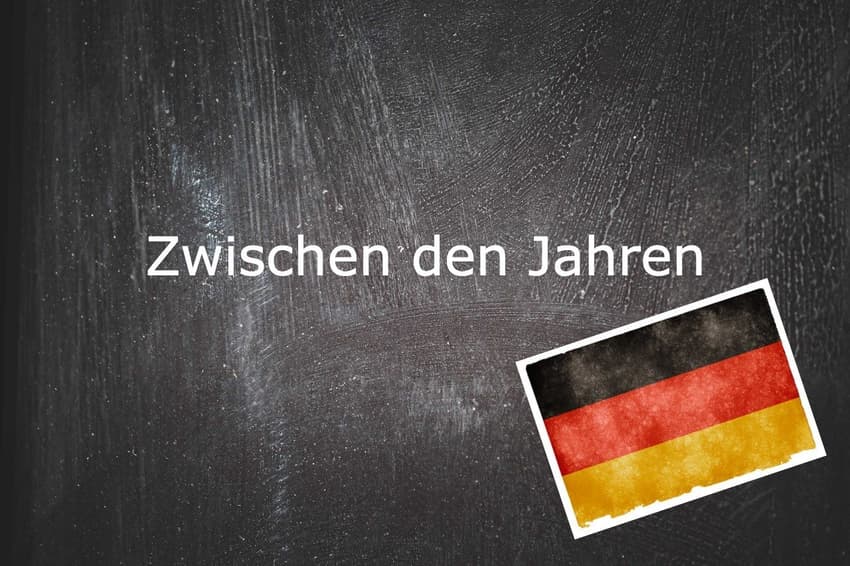German phrase of the day: Zwischen den Jahren

Here's why -and how - people in Germany are currently living 'between the years'.
Why do I need to know it?
Among Germans or in German-language media, you’re likely to hear and read this phrase a lot this week.
What does it mean?
Leave it to the German language to come up with a concise phrase that captures the time between Christmas and New Year's. Literally "between the years", the phrase typically refers to December 26th through January 1st. In southern Germany, the time frame can stretch until January 6th when Three Kings' Day is celebrated and the holiday season is officially over.
READ ALSO: Three Kings Day: What you should know about Germany's public holiday in three states
With the exception of the post-Christmas retail rush, life in Germany tends to be in a lull during this week. Many companies completely shut down their operations, or workers use up their remaining vacation days to relax with friends and family.
In some parts of Germany, superstition even has it brings bad luck to work zwischen den Jahren, so don't feel guilty sleeping in late or meeting up with your mates rather than catching up on emails.
What is the history behind it?
The centuries-old idiom is related to the different determinations of the turn of the year that existed until early modern times, according to the Society for the German Language.
According to the Roman calendar, the new year initially began on March 1st, when the high officials took office. In 153 AD, this occurred for the first time on January 1st, and from then on this day was considered the beginning of the year for the entire Roman Empire.
The Christians, on the other hand, initially began the year on the day of Jesus' baptism, January 6th. In the middle of the 4th century, when Jesus' birth was celebrated on December 25th instead of the baptism, they also moved the beginning of the year to this day.
After several changes of the beginning of the year in the Middle Ages, New Year's Day was finally fixed for the Christian world on January 1st in 1691.
So although there is actually no longer a period of time "between the years", the phrase has persisted to this day.
Examples of how it's used
Zum Glück muss ich zwischen den Jahren gar nicht arbeiten.
Luckily I don’t have to work at all during the time between Christmas and New Year.
Zwischen den Jahren treffe ich mich mit vielen alten Kumpels, die auch frei haben.
In the week leading up to New Year’s Eve I’m meeting with many old pals who also are on vacation.
Comments
See Also
Why do I need to know it?
Among Germans or in German-language media, you’re likely to hear and read this phrase a lot this week.
What does it mean?
Leave it to the German language to come up with a concise phrase that captures the time between Christmas and New Year's. Literally "between the years", the phrase typically refers to December 26th through January 1st. In southern Germany, the time frame can stretch until January 6th when Three Kings' Day is celebrated and the holiday season is officially over.
READ ALSO: Three Kings Day: What you should know about Germany's public holiday in three states
With the exception of the post-Christmas retail rush, life in Germany tends to be in a lull during this week. Many companies completely shut down their operations, or workers use up their remaining vacation days to relax with friends and family.
In some parts of Germany, superstition even has it brings bad luck to work zwischen den Jahren, so don't feel guilty sleeping in late or meeting up with your mates rather than catching up on emails.
What is the history behind it?
The centuries-old idiom is related to the different determinations of the turn of the year that existed until early modern times, according to the Society for the German Language.
According to the Roman calendar, the new year initially began on March 1st, when the high officials took office. In 153 AD, this occurred for the first time on January 1st, and from then on this day was considered the beginning of the year for the entire Roman Empire.
The Christians, on the other hand, initially began the year on the day of Jesus' baptism, January 6th. In the middle of the 4th century, when Jesus' birth was celebrated on December 25th instead of the baptism, they also moved the beginning of the year to this day.
After several changes of the beginning of the year in the Middle Ages, New Year's Day was finally fixed for the Christian world on January 1st in 1691.
So although there is actually no longer a period of time "between the years", the phrase has persisted to this day.
Examples of how it's used
Zum Glück muss ich zwischen den Jahren gar nicht arbeiten.
Luckily I don’t have to work at all during the time between Christmas and New Year.
Zwischen den Jahren treffe ich mich mit vielen alten Kumpels, die auch frei haben.
In the week leading up to New Year’s Eve I’m meeting with many old pals who also are on vacation.
Join the conversation in our comments section below. Share your own views and experience and if you have a question or suggestion for our journalists then email us at [email protected].
Please keep comments civil, constructive and on topic – and make sure to read our terms of use before getting involved.
Please log in here to leave a comment.